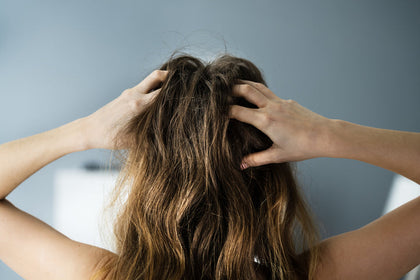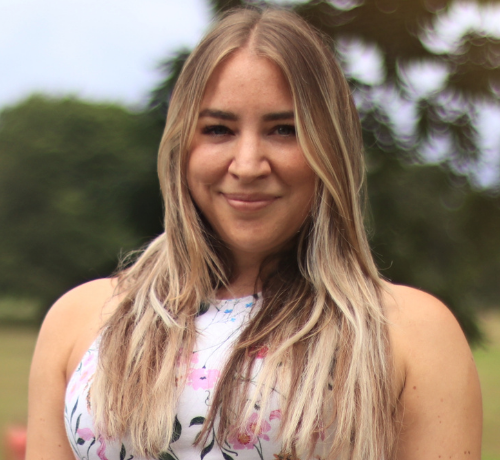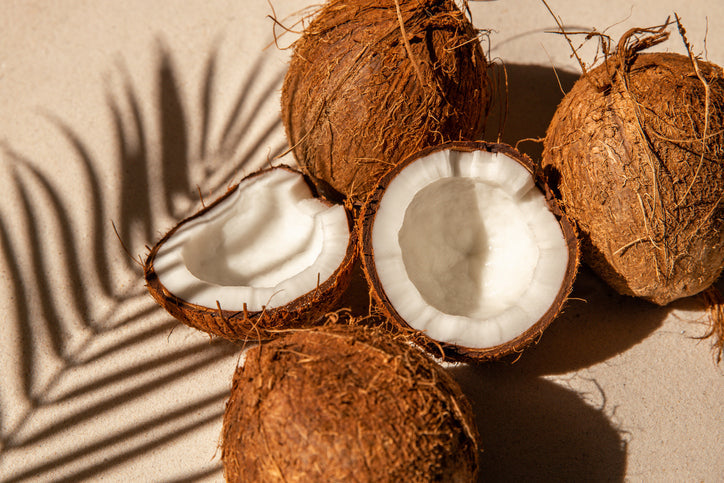Having to reach up and scratch your scalp is distracting and frustrating, and if you rub too much, you could end up with sore, painful broken skin. An itchy scalp, also known as scalp pruritus, has a wide range of causes. Keep reading to find out what can cause the itch, and discover the soothing, all-natural products to calm and balance your delicate scalp.
7 Reasons for an Itchy Scalp
An itchy scalp often comes in the form of dandruff and seborrheic dermatitis. For some people, an itchy scalp can be temporary, with itchy patches subsiding quickly, but for others, it can be an ongoing problem. If you're struggling with an itchy scalp, here are some possible causes.
1. Dandruff
Dr. Anna Chacon, a board-certified dermatologist and published author based in Miami, Florida, told VEGAMOUR, "Dandruff is a common cause of itching. When dandruff irritates the scalp, the outer skin layer sheds to combat the inflammation, causing it to feel itchy. Dandruff is caused by dead cells of the skin, which drop off the scalp and appear as white flakes on the hair."
The development of a fungus known as Malassezia yeast is the primary cause of dandruff. Malassezia relies on sebum and the scalp's natural oils to nourish the dandruff-causing fungus. So even if you don't see noticeable flaking on your scalp, you might still develop dandruff if your scalp is unhealthy. Severe dandruff is also called seborrheic dermatitis, and if the problem persists, it's worth checking in with a dermatologist to get specialist care.
What it feels and looks like: White flakes and a near-constant itchy scalp.
Causes: An overly oily scalp or a buildup of dead skin cells, styling products or Malassezia
To get relief: You might also try using natural remedies such as peppermint oil or tea tree oil with a bacterial or fungal infection with seborrheic dermatitis. Menthol essential oil and peppermint oil can have a particularly soothing effect on the skin if you suffer from seborrheic dermatitis.
2. Scalp Psoriasis
Psoriasis commonly appears on the elbows, around the knees and along the body's trunk, but did you know it can also show up on your scalp?
"A flare-up on the scalp occurs in approximately 50% of people with plaque psoriasis," said Dr. Velusamy MP of iCliniq. "Reddish patches, dandruff-like flaking, silvery-white scale and a dry scalp are all possible. Scalp psoriasis is frequently itchy, with itch ranging from mild to severe. Skin conditions, such as scalp psoriasis, impact the hair follicles as patches cover the scalp, preventing hair from growing as it should. As a result, those affected can experience hair loss, worsening if the flaky skin is hand-picked off."
What it feels and looks like: You're itching one specific spot, your skin feels raised and you notice scaly patches.
Causes: Scalp psoriasis is an autoimmune condition that tends to be genetic. Stress, a weak immune system, hormonal changes and dry weather can exacerbate the situation.
To get relief: Seek advice from a dermatologist who might suggest shampoo with coal tar or salicylic acid to soothe the area. One study also found that zinc pyrithione can significantly reduce the itch intensity. Apple cider vinegar may be effective in relieving a psoriasis-related itchy scalp because it has antifungal properties. The National Psoriasis Foundation suggests diluting one part organic apple cider vinegar in one part water and applying it to the scalp. Rinse your scalp with water after the solution has dried. Avoid this remedy if you have open wounds or your skin is cracked or bleeding.
More: Scalp Psoriasis vs. Dandruff — What's the Difference?
3. Allergic Reactions
"An itchy, dry and flaky scalp could signify that you must rinse the shampoo out of the hair more thoroughly," advised Velusamy. "Leaving shampoo on the scalp can irritate. An itchy scalp could also be due to allergic contact dermatitis. People who dye their hair frequently experience this. The culprit is frequently a dye ingredient called para-phenylenediamine (PPD), which is found in black hair dyes. It could also be an allergic reaction to a shampoo, conditioner or other product that comes into contact with the scalp."
What it feels and looks like: Your scalp might feel unbearably itchy, oily or greasy. In addition, if you use many hair products, you might further irritate the area.
Causes: Various ingredients in some hair products can irritate. If you've started using a new product, that could be the culprit.
To get relief: Consider non-toxic, moisturizing hair products with anti-inflammatory properties.
4. Head Lice
Velusamy said that you can get head lice by having close contact with someone who has it or by sharing items that they've used, such as a hat, brush or comb.
What it feels and looks like: Head lice can create a creepy, crawly, itchy feeling all over the scalp. Lice feed on human blood and lay their eggs near the roots.
Causes: As mentioned, sharing a hairbrush or coming into close contact with someone with lice will likely be the cause because lice are highly contagious.
To get relief: Use permethrin shampoo. You'll also need to comb out the lice and the eggs to ensure the scalp is clear. If the problem persists, discuss the issue with a doctor. Tea tree oil may also help with a lice-related itchy scalp.
5. Actinic Keratosis
Actinic keratosis, aka sun damage, can lead to growths and dry, scaly patches across the scalp. These legions are often considered pre-cancerous, so you must get any signs checked out with a doctor.
What it feels and looks like: The skin can feel dry, scaly and like sandpaper. Patches are usually 1cm to 2cm in size, and the color ranges from pink to red or brown.
Causes: This skin condition grows slowly and can develop over time due to consistent sun exposure. It is often found on the scalp, ears, lips and the back of the head.
To get relief: Reduce sun exposure and use sunscreen daily. Talk to your doctor about prescription creams and gels. You might also discuss freezing the patches or even removal surgery.
6. Scalp Dysesthesia
Scalp dysesthesia is actually a cervical spine condition that can cause itching around the scalp.
What it feels and looks like: This condition can be very itchy, and sufferers might also experience a burning sensation.
Causes: If you have ever experienced a traumatic head or neck injury that impacts the spinal cord and then experienced itching, you could have this neurological condition. It's a nerve-related itch that can signal physical or psychological distress.
To get relief: Speak to a doctor and don't panic. This condition is usually seen in elderly patients, and the key treatment is a low dose of antidepressants.
7. Atopica dermatitis
Atopic dermatitis is an inflammatory skin condition commonly known as eczema. It can occur anywhere on the body, including the scalp, and it's very itchy.
What it feels and looks like: You'll notice itchiness around the scalp, and you might spot some redness.
Causes: Atopic dermatitis is usually hereditary, and you might experience it if other family members have it too.
To get relief: Speak to a dermatologist to ensure a proper diagnosis and treatment plan.
Nourish Your Scalp
An itchy scalp is deeply irritating and can be a symptom of many different conditions. You can use at-home remedies to resolve the issue, but if the itching is severe or you experience broken skin or open wounds, consult with your doctor.
Healthy hair starts with a healthy scalp. To keep your scalp balanced, healthy and itch-free from day to day, commit to using calming, natural products that remove buildup, moisturize, protect and soothe!
#include-related-slider#
More From VEGAMOUR
Photo credit: AndreyPopov/iStock



















